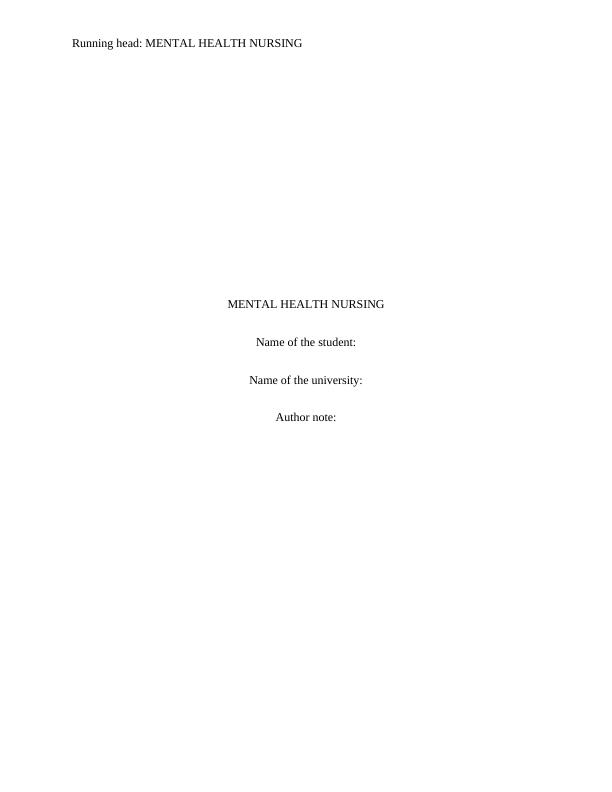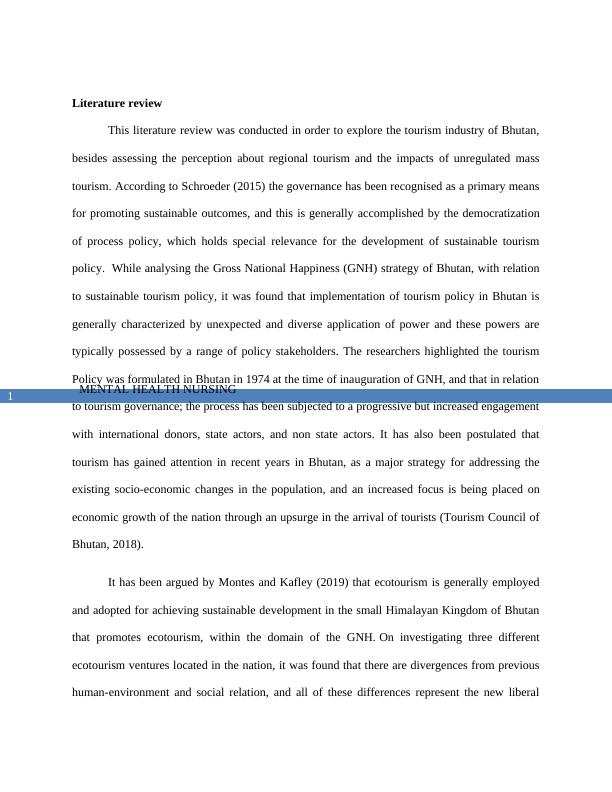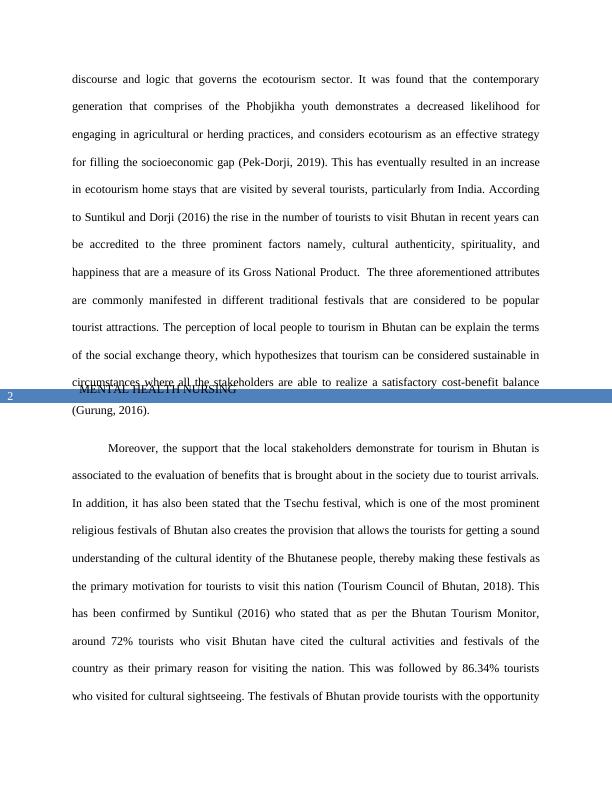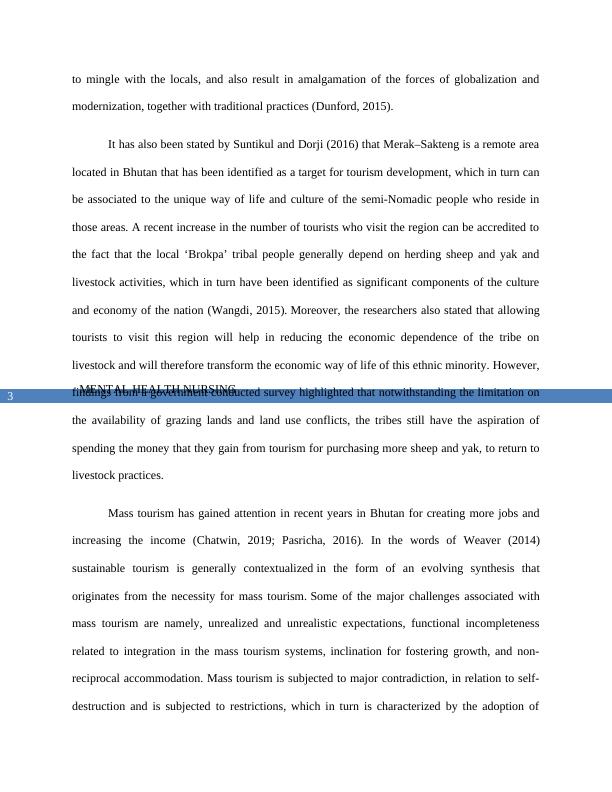Mental Health Nursing | Assessment
The assignment is an independent research approval form for a project on Bhutan's Regional Tourism, focusing on the impact of rapid growth in regional tourism in Bhutan's tourism sector.
14 Pages3198 Words51 Views
Added on 2022-10-08
Mental Health Nursing | Assessment
The assignment is an independent research approval form for a project on Bhutan's Regional Tourism, focusing on the impact of rapid growth in regional tourism in Bhutan's tourism sector.
Added on 2022-10-08
ShareRelated Documents
Running head: MENTAL HEALTH NURSING
MENTAL HEALTH NURSING
Name of the student:
Name of the university:
Author note:
MENTAL HEALTH NURSING
Name of the student:
Name of the university:
Author note:

MENTAL HEALTH NURSING
1
Literature review
This literature review was conducted in order to explore the tourism industry of Bhutan,
besides assessing the perception about regional tourism and the impacts of unregulated mass
tourism. According to Schroeder (2015) the governance has been recognised as a primary means
for promoting sustainable outcomes, and this is generally accomplished by the democratization
of process policy, which holds special relevance for the development of sustainable tourism
policy. While analysing the Gross National Happiness (GNH) strategy of Bhutan, with relation
to sustainable tourism policy, it was found that implementation of tourism policy in Bhutan is
generally characterized by unexpected and diverse application of power and these powers are
typically possessed by a range of policy stakeholders. The researchers highlighted the tourism
Policy was formulated in Bhutan in 1974 at the time of inauguration of GNH, and that in relation
to tourism governance; the process has been subjected to a progressive but increased engagement
with international donors, state actors, and non state actors. It has also been postulated that
tourism has gained attention in recent years in Bhutan, as a major strategy for addressing the
existing socio-economic changes in the population, and an increased focus is being placed on
economic growth of the nation through an upsurge in the arrival of tourists (Tourism Council of
Bhutan, 2018).
It has been argued by Montes and Kafley (2019) that ecotourism is generally employed
and adopted for achieving sustainable development in the small Himalayan Kingdom of Bhutan
that promotes ecotourism, within the domain of the GNH. On investigating three different
ecotourism ventures located in the nation, it was found that there are divergences from previous
human-environment and social relation, and all of these differences represent the new liberal
1
Literature review
This literature review was conducted in order to explore the tourism industry of Bhutan,
besides assessing the perception about regional tourism and the impacts of unregulated mass
tourism. According to Schroeder (2015) the governance has been recognised as a primary means
for promoting sustainable outcomes, and this is generally accomplished by the democratization
of process policy, which holds special relevance for the development of sustainable tourism
policy. While analysing the Gross National Happiness (GNH) strategy of Bhutan, with relation
to sustainable tourism policy, it was found that implementation of tourism policy in Bhutan is
generally characterized by unexpected and diverse application of power and these powers are
typically possessed by a range of policy stakeholders. The researchers highlighted the tourism
Policy was formulated in Bhutan in 1974 at the time of inauguration of GNH, and that in relation
to tourism governance; the process has been subjected to a progressive but increased engagement
with international donors, state actors, and non state actors. It has also been postulated that
tourism has gained attention in recent years in Bhutan, as a major strategy for addressing the
existing socio-economic changes in the population, and an increased focus is being placed on
economic growth of the nation through an upsurge in the arrival of tourists (Tourism Council of
Bhutan, 2018).
It has been argued by Montes and Kafley (2019) that ecotourism is generally employed
and adopted for achieving sustainable development in the small Himalayan Kingdom of Bhutan
that promotes ecotourism, within the domain of the GNH. On investigating three different
ecotourism ventures located in the nation, it was found that there are divergences from previous
human-environment and social relation, and all of these differences represent the new liberal

MENTAL HEALTH NURSING
2
discourse and logic that governs the ecotourism sector. It was found that the contemporary
generation that comprises of the Phobjikha youth demonstrates a decreased likelihood for
engaging in agricultural or herding practices, and considers ecotourism as an effective strategy
for filling the socioeconomic gap (Pek-Dorji, 2019). This has eventually resulted in an increase
in ecotourism home stays that are visited by several tourists, particularly from India. According
to Suntikul and Dorji (2016) the rise in the number of tourists to visit Bhutan in recent years can
be accredited to the three prominent factors namely, cultural authenticity, spirituality, and
happiness that are a measure of its Gross National Product. The three aforementioned attributes
are commonly manifested in different traditional festivals that are considered to be popular
tourist attractions. The perception of local people to tourism in Bhutan can be explain the terms
of the social exchange theory, which hypothesizes that tourism can be considered sustainable in
circumstances where all the stakeholders are able to realize a satisfactory cost-benefit balance
(Gurung, 2016).
Moreover, the support that the local stakeholders demonstrate for tourism in Bhutan is
associated to the evaluation of benefits that is brought about in the society due to tourist arrivals.
In addition, it has also been stated that the Tsechu festival, which is one of the most prominent
religious festivals of Bhutan also creates the provision that allows the tourists for getting a sound
understanding of the cultural identity of the Bhutanese people, thereby making these festivals as
the primary motivation for tourists to visit this nation (Tourism Council of Bhutan, 2018). This
has been confirmed by Suntikul (2016) who stated that as per the Bhutan Tourism Monitor,
around 72% tourists who visit Bhutan have cited the cultural activities and festivals of the
country as their primary reason for visiting the nation. This was followed by 86.34% tourists
who visited for cultural sightseeing. The festivals of Bhutan provide tourists with the opportunity
2
discourse and logic that governs the ecotourism sector. It was found that the contemporary
generation that comprises of the Phobjikha youth demonstrates a decreased likelihood for
engaging in agricultural or herding practices, and considers ecotourism as an effective strategy
for filling the socioeconomic gap (Pek-Dorji, 2019). This has eventually resulted in an increase
in ecotourism home stays that are visited by several tourists, particularly from India. According
to Suntikul and Dorji (2016) the rise in the number of tourists to visit Bhutan in recent years can
be accredited to the three prominent factors namely, cultural authenticity, spirituality, and
happiness that are a measure of its Gross National Product. The three aforementioned attributes
are commonly manifested in different traditional festivals that are considered to be popular
tourist attractions. The perception of local people to tourism in Bhutan can be explain the terms
of the social exchange theory, which hypothesizes that tourism can be considered sustainable in
circumstances where all the stakeholders are able to realize a satisfactory cost-benefit balance
(Gurung, 2016).
Moreover, the support that the local stakeholders demonstrate for tourism in Bhutan is
associated to the evaluation of benefits that is brought about in the society due to tourist arrivals.
In addition, it has also been stated that the Tsechu festival, which is one of the most prominent
religious festivals of Bhutan also creates the provision that allows the tourists for getting a sound
understanding of the cultural identity of the Bhutanese people, thereby making these festivals as
the primary motivation for tourists to visit this nation (Tourism Council of Bhutan, 2018). This
has been confirmed by Suntikul (2016) who stated that as per the Bhutan Tourism Monitor,
around 72% tourists who visit Bhutan have cited the cultural activities and festivals of the
country as their primary reason for visiting the nation. This was followed by 86.34% tourists
who visited for cultural sightseeing. The festivals of Bhutan provide tourists with the opportunity

MENTAL HEALTH NURSING
3
to mingle with the locals, and also result in amalgamation of the forces of globalization and
modernization, together with traditional practices (Dunford, 2015).
It has also been stated by Suntikul and Dorji (2016) that Merak–Sakteng is a remote area
located in Bhutan that has been identified as a target for tourism development, which in turn can
be associated to the unique way of life and culture of the semi-Nomadic people who reside in
those areas. A recent increase in the number of tourists who visit the region can be accredited to
the fact that the local ‘Brokpa’ tribal people generally depend on herding sheep and yak and
livestock activities, which in turn have been identified as significant components of the culture
and economy of the nation (Wangdi, 2015). Moreover, the researchers also stated that allowing
tourists to visit this region will help in reducing the economic dependence of the tribe on
livestock and will therefore transform the economic way of life of this ethnic minority. However,
findings from a government conducted survey highlighted that notwithstanding the limitation on
the availability of grazing lands and land use conflicts, the tribes still have the aspiration of
spending the money that they gain from tourism for purchasing more sheep and yak, to return to
livestock practices.
Mass tourism has gained attention in recent years in Bhutan for creating more jobs and
increasing the income (Chatwin, 2019; Pasricha, 2016). In the words of Weaver (2014)
sustainable tourism is generally contextualized in the form of an evolving synthesis that
originates from the necessity for mass tourism. Some of the major challenges associated with
mass tourism are namely, unrealized and unrealistic expectations, functional incompleteness
related to integration in the mass tourism systems, inclination for fostering growth, and non-
reciprocal accommodation. Mass tourism is subjected to major contradiction, in relation to self-
destruction and is subjected to restrictions, which in turn is characterized by the adoption of
3
to mingle with the locals, and also result in amalgamation of the forces of globalization and
modernization, together with traditional practices (Dunford, 2015).
It has also been stated by Suntikul and Dorji (2016) that Merak–Sakteng is a remote area
located in Bhutan that has been identified as a target for tourism development, which in turn can
be associated to the unique way of life and culture of the semi-Nomadic people who reside in
those areas. A recent increase in the number of tourists who visit the region can be accredited to
the fact that the local ‘Brokpa’ tribal people generally depend on herding sheep and yak and
livestock activities, which in turn have been identified as significant components of the culture
and economy of the nation (Wangdi, 2015). Moreover, the researchers also stated that allowing
tourists to visit this region will help in reducing the economic dependence of the tribe on
livestock and will therefore transform the economic way of life of this ethnic minority. However,
findings from a government conducted survey highlighted that notwithstanding the limitation on
the availability of grazing lands and land use conflicts, the tribes still have the aspiration of
spending the money that they gain from tourism for purchasing more sheep and yak, to return to
livestock practices.
Mass tourism has gained attention in recent years in Bhutan for creating more jobs and
increasing the income (Chatwin, 2019; Pasricha, 2016). In the words of Weaver (2014)
sustainable tourism is generally contextualized in the form of an evolving synthesis that
originates from the necessity for mass tourism. Some of the major challenges associated with
mass tourism are namely, unrealized and unrealistic expectations, functional incompleteness
related to integration in the mass tourism systems, inclination for fostering growth, and non-
reciprocal accommodation. Mass tourism is subjected to major contradiction, in relation to self-
destruction and is subjected to restrictions, which in turn is characterized by the adoption of

End of preview
Want to access all the pages? Upload your documents or become a member.
Related Documents
Tourism An Effective Means of Economiclg...
|8
|2011
|18
Sustainable Tourism Developmentlg...
|8
|2076
|403
Sustainable Tourism Developmentlg...
|13
|788
|51
Sustainable Operations and Destinations Assignmentlg...
|5
|1006
|170
Function of Government and International Agencies in Travel and Tourism Industrylg...
|12
|503
|71
Sustainable Tourism Development: An Annotated Bibliographylg...
|10
|2412
|436
